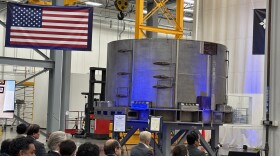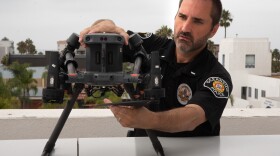>>> San Diego is situated at the heart of two competing visions of the world. The Trump administrations view of the border as a place to be fortified and strengthened to keep Mexico and the United States apart and the United -- reality that the two countries are connected to benefit both cultures. Our next guest has personal experience for experiencing the cultures of San Diego and said Tijuana. At the author of the new book vanishing frontiers. We are joined by Skype. Andrew, thank you for joining us. Speak and it is great to be with you on KPBS. >>> It has been a tense year with US-Mexico relations with border wall prototype springing up in our backyard. I understand what is the things that got you to write the book is the way that one of our San Diego Tijuana leaders that speak of this region as one mega region. Give us an example of how we are becoming one single metropolitan area . >> it is surprising to me because I lived in San Diego and Tijuana in the 1990s. They were distant cities. Today they are a simple Metro region. The airport bridge is a good example. It allows people in San Diego to use the Tijuana airport as though it were an additional international airport of San Diego the solution to the internal question of San Diego of years and years of how to expand the airport or do you build a new airport. It turns out that San Diego did not need to do that. They just had to connect to the Tijuana airport that had longer airways and flights to Asia. Said to build a bridge. Think of it as the regional Airport. Tijuana is pending a lot of time trying to figure out the complementarity's of their any factoring base and research and development and University Museum partnerships. There is so much going on it is hard to track. >>> One thing that struck me is the story of how small towns in Mexico and the United States have been transformed. Describe how Mexico is changing because of U.S. investments and the U.S. is changing because of Mexican investments here. Is it NAFTA that is leading to this intertwined relationship? >> NAFTA is very important. That's what got this going. There is trait going back and forth : troll -- agricultural goods. Then there is a lot of shared manufacturing. Much of what we call trade. This is unusual. Only something we have with Mexico and Canada. We make a lot of goods together like automobiles, any vehicle you can get into in the United States, a car, train, airplane, almost certainly was made in Mexico, United States, Canada. And then you have lots of investments. But the last 10 years we have seen a lot of Mexican companies invest in the United States. Some of our best loved brands turn out to be Mexican owned. Recorder the bread wheat eat in the United States is one Mexican company who owns it, and amends, Sara Lee, they are also my favorite one is Thomas English muffins which turns out is not English anymore. >>> You have opened my eyes to the Mexican own things in his country. What happens if NAFTA in spirit >> In the short term businesses will deal with it. In the long term you will see it will be less attractive to make things in North America. They will look at other markets abroad. It will not happen tomorrow. The initial pain will be things that are true trades. Agricultural products will hit -- get hit hard. We will lose things like auto production. What has had in the last 20 years is not only has the American car industry survived by reaching out into Mexico and Canada, but the foreign car companies came to North America as well. They are making their cars in North America. Overtime, they will offshore to other parts of the world. >>> In spite of the connections, there are people who want to see President Donald Trump's wall go up. What is driving this intimate? >> I think there are practical reasons and there are polyp reasons. I see in the book that the wall is not about Mexico. When we talk about Mexico we are talking only about our position in the world. I think our position in the world is can we keep out things that are happening around us. Emigration. Most immigration is not from Mexico and worth from Asia. But Mexico is the symbol of emigration. Trade, terrorism, it is about those things that scare us about the world that we want to keep out. >>> And your book you provided an optimistic view about Mexican U.S. relations. There are things the country has to contend with like violence. Homicides and Tijuana hit a record high in 2017. Is it possible you have underplayed that problem? >> My most pessimistic chapter is about violence and pessimistically. I think there is a lot of cooperation I go into. I interviewed a lot of people in law enforcement, intelligence, the military. The cooperation is amazing. It is phenomenal the trust that has been built up. You do not see it producing the results you expect to see it produce. The political guidance is not there. my sense is that we have not fully embraced what needs to be done on the side of the border which is dealing with the epidemic of heroin and opioid abuse which is spiking the violence in Mexico. The shift to Haran and synthetic opioids. We know it's a crisis we have not done what we need to do to deal with treatment and demand. We have not dealt with money laundering and arms trafficking. In Mexico, most of Mexico is behind on building their own wall. >>> Is there anything in your research that took you by surprised in writing this book ? >> Lots of things. The Mexican investment in the United States took me by surprise. The one thing I discovered, the NBA, NFL, and major-league baseball made commitments to play regular-season games in Mexico. You have the Padres and the Dodgers a three-game series in Monterey a month ago. These are the three biggest sports leagues in the United States and they made a commitment to Mexico and see that as a future market and that tells you how far we are going down the way to emigration. Of course you have the World Cup also which Mexico is going to host that in 2026. If you the look at politics or sports, politics tells you where we are, but sports tells you about the future. I think in the future, if you follow or sports is going, there is a deeper engagement coming in the future between our two countries. >>> Next month Mexican voters elect a new president. How will that affect U.S. Mexican relations? >> I think Mexicans are feeling hurt by the United States. They have seen our president lash out a number of times at Mexico. Mexicans in the last 20 to 25 years have grown to believe that their future is tied to the United States. You will see the next president of Mexico, whoever comes next is likely to be more skeptical about the engagement with the U.S. They will reflect that mood. That will be the big change. They won't be anti-American. But they are likely to be less enthusiastic about deepening their economic relationship with the U.S. unlike the most recent presidents with Mexico who have all seen the U.S. as a major opportunity, I think they will pull out a little bit. >>> Thank you for joining us. >> Thank you so much.
San Diego is situated at the heart of two competing visions of the world.
President Trump views the border as a place to be fortified and strengthened while the mayors of San Diego and Tijuana talk about the area as a single mega-region.
This complicated relationship is the topic of the new book, “Vanishing Frontiers: The Forces Driving Mexico and the United States Together.”
Author Andrew Selee, president of the Migration Policy Institute, writes the U.S. and Mexico have never been more connected: culturally, economically and politically.
From the bread we eat to the cars we drive and the movies we watch, Selee chronicles the economic and cultural connections between the two nations and explores what would happen if a wall gets built and NAFTA goes away.
Selee joins KPBS Midday Edition Wednesday to discuss the state of U.S.-Mexico relations.






